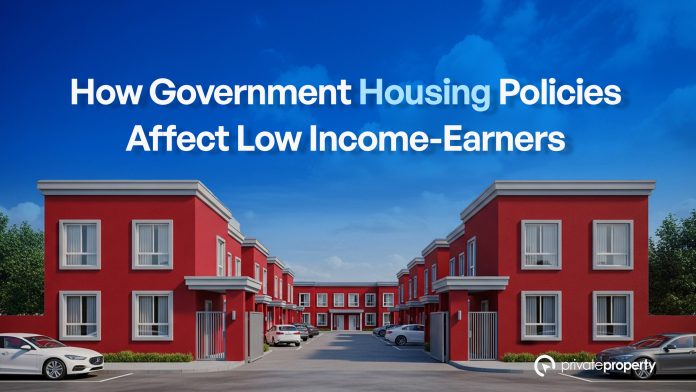Access to safe, affordable, and decent housing is a fundamental human right. For low-income earners, however, this right often feels out of reach due to various socio-economic barriers. While housing policies are designed to create opportunities and provide relief, their execution and structure can either uplift vulnerable populations or further entrench inequality.
In Nigeria and many developing countries, the impact of government housing policies on low-income earners is particularly significant, influencing everything from rent prices to home ownership, urban migration, and quality of life.
Understanding Housing Policies
Government housing policies are a set of laws, regulations, and initiatives created to manage housing supply, demand, affordability, and quality. These policies typically aim to:
- Encourage affordable housing development
- Regulate the rental market
- Offer financial assistance or subsidies
- Improve urban planning
- Upgrade slums and informal settlements
While these objectives are commendable, the effectiveness of these policies depends heavily on their design, funding, transparency, and alignment with the real needs of low-income citizens.
The Positive Impact of Housing Policies on Low-Income Earners
- Affordable Housing Projects
Government-backed housing schemes, such as the National Housing Programme (NHP) or state-level initiatives, aim to provide homes at subsidized rates for low-income households. These projects can significantly reduce housing costs and help bridge the gap between demand and supply.
In cases where such projects are effectively executed, they allow beneficiaries to move from overcrowded, informal settlements to planned communities with basic infrastructure like water, roads, and electricity.
- Access to Mortgage Financing
Some housing policies aim to make mortgages accessible to low-income earners. For instance, the Federal Mortgage Bank of Nigeria (FMBN) and National Housing Fund (NHF) allow eligible contributors to access low-interest loans with longer repayment periods. This is intended to make homeownership less daunting for individuals with modest incomes.
- Urban Renewal and Slum Upgrading
Urban renewal policies focus on improving living conditions in slums through better roads, sanitation, and waste management. These interventions, when well-planned, can enhance the safety, health, and dignity of low-income residents without displacing them.
- Rent Control and Tenant Rights
Some states implement rent control laws or tenant protection policies to prevent exploitation by landlords. These laws help stabilize rent prices and protect tenants from arbitrary evictions, giving low-income renters a measure of security.
Challenges and Limitations
Despite the noble intentions behind many housing policies, several issues prevent them from having a wide-reaching and sustainable impact on low-income earners.
- Insufficient Implementation and Corruption
A major problem is poor execution. Many housing projects suffer delays, misallocation of units, or substandard construction due to corruption or lack of oversight. As a result, homes meant for low-income earners often end up in the hands of politically connected individuals or middle-income earners.
- Mismatch Between Policy and Reality
Many policies assume that low-income earners have the financial literacy, savings culture, or steady employment needed to benefit from mortgage schemes or homeownership programmes. In reality, many workers in Nigeria’s informal economy do not meet these criteria, effectively excluding them from such initiatives.
- Urban Displacement
While slum upgrading and urban renewal projects are helpful in theory, in practice they sometimes lead to the forced eviction of low-income communities to make way for commercial developments. This can push vulnerable groups further into poverty and insecurity.
- Inadequate Funding
Housing policies often lack adequate government funding, leading to poorly maintained facilities and limited reach. Without private sector participation or public-private partnerships, these initiatives struggle to scale up to meet the growing housing deficit.
Recommendations for More Inclusive Housing Policies
To make housing policies truly beneficial for low-income earners, governments need to:
- Improve Transparency and Accountability: Ensure that housing projects reach their intended beneficiaries through open registration and allocation processes.
- Support the Informal Sector: Design policies that consider the unique financial realities of informal workers by offering flexible payment terms or micro-mortgages.
- Invest in Rental Housing: Not all low-income earners can or want to own homes. Affordable, safe, and well-regulated rental housing should be part of the solution.
- Encourage Community Participation: Involve local communities in the planning and implementation of housing projects to ensure they meet actual needs.
- Strengthen Legal Frameworks: Enforce rent control laws and protect tenants’ rights to prevent exploitation and evictions.
Final Thoughts
Government housing policies have the power to change lives—when they are designed inclusively and implemented transparently. For low-income earners, the impact of these policies goes beyond shelter; it influences health, education, economic mobility, and social stability. As urban populations continue to grow and housing demand rises, Nigeria’s policymakers must prioritize long-term, equitable solutions that place the dignity and welfare of all citizens—especially the most vulnerable—at the heart of urban development.
By creating housing policies that work for the poor, we build not just homes, but stronger, more inclusive communities.









